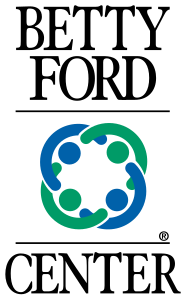Betty Ford Center
| Betty Ford Center | |
|---|---|
| Sponsorship | Betty Ford Center Foundation |
| place | Rancho Mirage , California |
| Coordinates | 33 ° 45 '44 " N , 116 ° 24' 21" W |
| Chief Executive Officer | John T. Schwarzlose |
| beds | 80 |
| founding | 4th October 1982 |
| Website | bettyfordcenter.org |
The Betty Ford Center is a nonprofit drug and alcohol withdrawal clinic in Rancho Mirage , California . The center is directed by Betty Ford's daughter Susan Ford Bales and operated by the Betty Ford Center Foundation .
history
The clinic was founded in 1982 by Betty Ford , the wife of former US President Gerald Ford , together with former US Ambassador to Belgium , Leonard Firestone . Previously, Betty Ford had successfully undergone a lengthy detox due to her alcohol and morphine addiction at Long Beach Naval Hospital and then made the decision to set up a treatment center that would specifically meet the needs of addicted women. From the beginning, 50% of the 80 clinic places were provided for women.
Accommodation
The clinic is located on the Eisenhower Medical Center grounds in Rancho Mirage. The center is built in a pavilion style and has rather simple accommodations. The individual pavilions are each intended for 20 patients. They each have eight double rooms and one four-bed room. Men and women are housed in different houses and are involved in the daily cleaning.
treatment
The center treats patients with a wide variety of addictions , including alcohol, medication , cocaine , crack and heroin . Patients will not be admitted if they have additional psychiatric illnesses or severe personality disorders . The basic condition for admission is that the registration is carried out by the patient himself and that relatives are specified. The waiting time is around two weeks.
Treatment in the clinic is structured and strict. It takes place as group therapy and usually lasts about four weeks inpatient with the possibility of day-clinic and outpatient treatment. The center offers seven different therapy programs, in which the families of the addicts are also included.
Treatment programs:
- Inpatient detox and treatment - 30 days
- Residential Day Treatment - 30–60 days of day clinical treatment, usually followed by outpatient treatment
- Intensive Outpatient Program - five evenings a week for eight weeks
- Clinical Diagnostic Evaluation - Diagnostic program to clarify whether there is an addiction
- Family program-education - additional offer for family members (from the age of 13)
- Children's program - four-day program for children aged 7 to 12 from families with addiction problems
Patient
The BFC owes its high degree of general awareness not least to its frequently published status as the first point of contact for American celebrities on rehab, for example through the stays of Liza Minnelli (1984), Elizabeth Taylor (1983 and 1988), Johnny Cash (1984), Tony Curtis ( 1984), Tammy Wynette (1986), Ozzy Osbourne (1986), Robert Mitchum (1990s), Vince Neil (mid-1990s), David Hasselhoff (2002) and Lindsay Lohan (2010 and 2013) in the clinic.
The Betty Ford Center is not limited to the upper classes, however. More than 90% of the patients come mainly from the middle class, some from the lower class.
education
The center offers doctors and psychologists the opportunity to take part in the full inpatient therapy program for one week as part of a Professional in Residence Program , as well as the family week for a second week. This is intended to compensate for deficits in medical training on addictions and their treatment.
literature
- James W. West: The Betty Ford Center book of answers: help for those struggling with substance abuse and for the people who love them. Pocket Books, 1997, ISBN 0-671-00182-5
- Betty Ford : Healing and Hope: Six Women from the Betty Ford Center Share Their Powerful Journeys of Addiction and Recovery. Putnam, 2003, ISBN 0-399-15138-9
Individual evidence
- ^ History of the Betty Ford Center
- ↑ Facilities
- ↑ a b c d e Bernhard Mäulen: Betty Ford Center: Qualified addiction therapy not only for the rich. Dtsch Arztebl 96 (1999), A-403, online
- ^ Treatment Programs
- ^ Mötley Crüe : The Dirt . Autobiography of the glam metal band Mötley Crüe, co-authored with Neil Strauss , from the American by Kirsten Borchardt , Hannibal Verlag , Höfen , 2nd edition, 2002. p. 330

